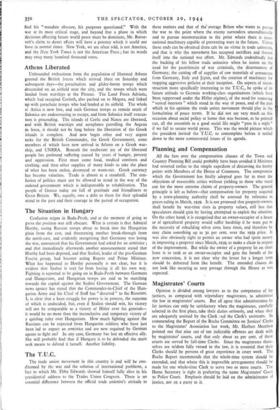Magistrates' Courts
Opinion is divided among lawyers as to the competence of lay justices, as compared with stipendiary magistrates, to administer the law in magistrates' courts. But all agree that administration by lay justices can only be satisfactory when the magistrates, carefully selected in the first place, take their duties seriously, and when they are adequately assisted by the Clerk snd the Clerk's assistants. In commending the Report of the Roche Committee on Justices' Clerks to the Magistrates' Association last week, Mr. Herbert Morrison pointed out that nine out of ten indictable offences are dealt with by magistrates' courts, and that only about io per cent. of these courts are served by full-time Clerks. Since the magistrates them- selves are seldom fully versed in the law, it is essential that their Clerks should be persons of great experience in court work. The Roche Report recommends that the whole-time system should be extended, and that where this is impossible arrangements should be made for one whole-time Clerk to serve two or more courts. The Home Secretary is right in preferring the name Magistrates' Court to Police Court. Emphasis should be laid on the administrator of justice, not on a party to it.


























 Previous page
Previous page